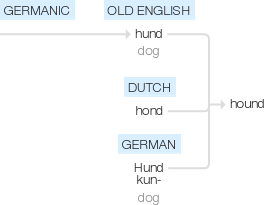Hound
Old English hund (in the general sense ‘dog’), of Germanic origin; related to Dutch hond and German Hund, from an Indo-European root shared by Greek kuōn, kun- ‘dog’.
wiktionary
From Middle English hound, from Old English hund, from Proto-West Germanic *hund, from Proto-Germanic *hundaz. Cognate with West Frisian hûn, Dutch hond, Luxembourgish Hond, German Hund, German Low German Hund, Danish hund, Faroese hundur, Icelandic hundur, Norwegian Bokmål hund, Norwegian Nynorsk hund, and Swedish hund, from pre-Germanic *ḱuntós (compare Latvian sùnt-ene(“big dog”), enlargement of Proto-Indo-European *ḱwṓ(“dog”) (compare Welsh cwn(“dogs”), Tocharian B ku, Lithuanian šuõ, Armenian շուն(šun), Russian сука(suka). Doublet of canine.
From Middle English hounden, from the noun (see above).
From Middle English hownde, hount, houn, probably from Old Norse húnn, from Proto-Germanic *hūnaz.
etymonline
hound (n.)
Old English hund "dog," from Proto-Germanic *hundaz (source also of Old Saxon and Old Frisian hund, Old High German hunt, German Hund, Old Norse hundr, Gothic hunds), from PIE *kwnto-, dental enlargement of root *kwon- "dog." Meaning narrowed 12c. to "dog used for hunting" (compare dog (n.)). Contemptuously, of a man, from late Old English.
hound (v.)
"hunt with hounds," 1520s, from hound (n.). Figurative sense "pursue relentlessly" first recorded c. 1600. Related: Hounded; hounding.
